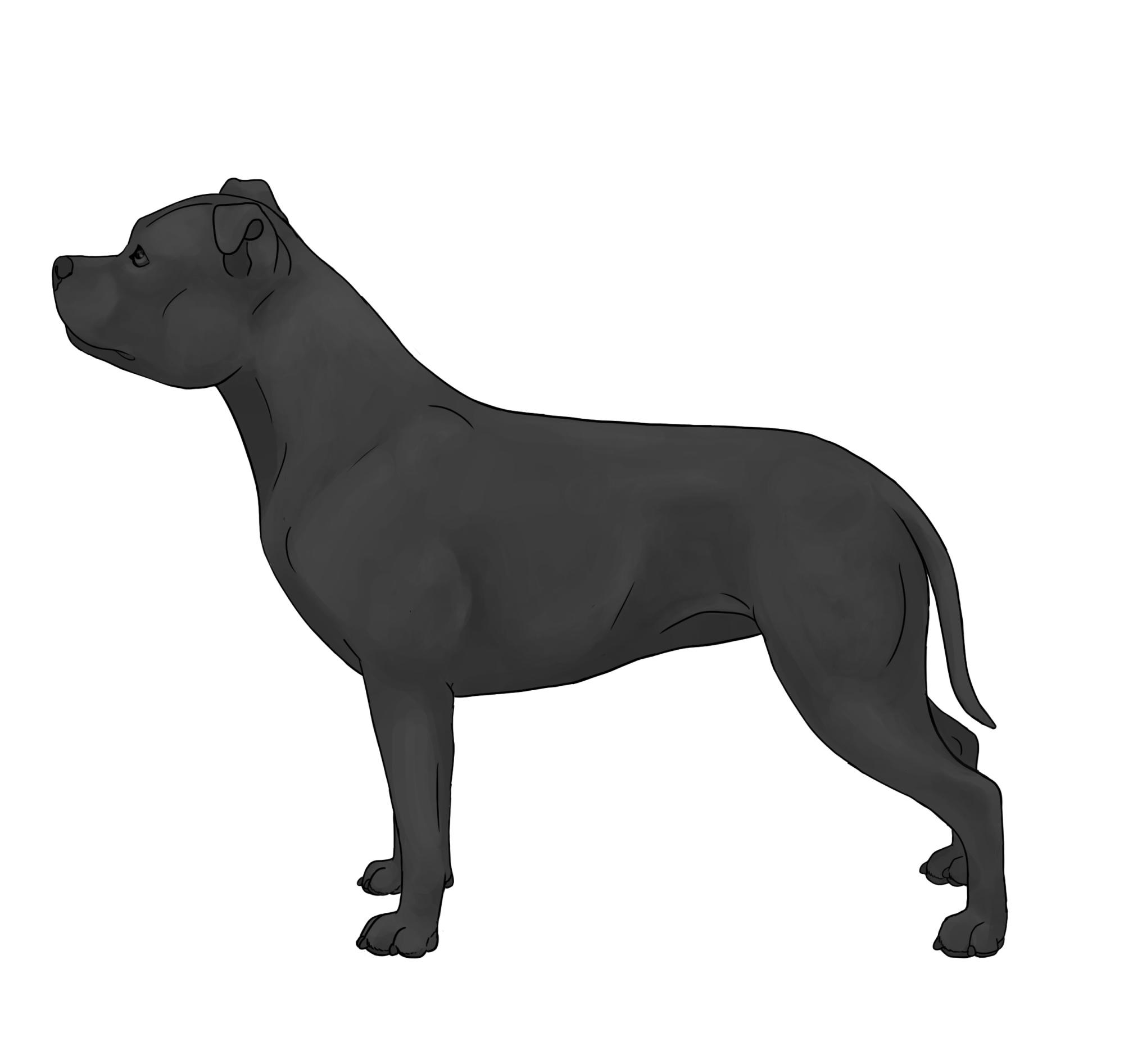Staffordshire Bull Terrier
Terrier Group
The goals and purposes of this breed standard include: to furnish guidelines for breeders who wish to maintain the quality of their breed and to improve it; to advance this breed to a state of similarity throughout the world; and to act as a guide for judges.
Breeders and judges have the responsibility to avoid any conditions or exaggerations that are detrimental to the health, welfare, essence and soundness of this breed, and must take the responsibility to see that these are not perpetuated.
Any departure from the following should be considered a fault, and the seriousness with which the fault should be regarded should be in exact proportion to its degree and its effect upon the health and welfare of the dog and on the dog’s ability to perform its traditional work.
History
The Staffordshire Bull Terrier is a descendant of the Bull and Terrier crosses made in Great Britain in the late 1700's. It was given the name "Staffordshire" in reference to an area where it was very popular, to differentiate it from the other Bull and Terrier breeds.
The Staffordshire Bull Terrier was recognized by the United Kennel Club in 1975.
General Appearance
The Staffordshire Bull Terrier is a smooth coated dog that possesses great strength for its size. Although muscular, it is active and agile.
Disqualification: Unilateral or bilateral cryptorchid.
Characteristics
This breed has indomitable courage, high intelligence and tenacity. Coupled with its affection for its friends, and children in particular, its quietness and trustworthy stability make it an all-purpose dog.
Disqualification: Viciousness or extreme shyness.
Head
The head is short and deep throughout with a distinct stop.
SKULL
The skull is broad and the cheek muscles are very pronounced.
MUZZLE
the foreface is short, with strong jaws and clean, tight lips.
TEETH
A full complement of strong, white teeth meet in a scissors bite; the outer side of the lower incisors touching the inner side of the upper incisors.
Serious Faults: Badly overshot or undershot bites.
EYES
Dark eyes are preferred, but may bear some relation to coat color. The round, medium size eyes are set on to look straight ahead. Dark eye rims are preferred.
NOSE
The nose is black.
EARS
The rose or half-pricked ears are not large.
Serious Faults: Full drop ear. Full prick ear.
Neck
The muscular, rather short neck is clean in outline and widens gradually toward the shoulders.
Forequarters
The shoulders are well laid back.
FORELEGS
The straight, well-boned forelegs are set rather far apart at the shoulders, but show no looseness at the elbow. The pasterns are strong, and the feet turn out slightly.
Body
The body is close-coupled with a broad, deep chest and well-sprung ribs. The loins are fairly light and the topline is level.
Hindquarters
The hindquarters are well-muscled.
HIND LEGS
The stifles are well-bent. The hocks are well let down. The legs are parallel when viewed from behind. Dewclaws are generally removed from the hind legs.
Feet
The strong, medium sized feet are well padded.
Tail
The medium-length tail is not docked. It is low set, carried rather low and tapers to a point. It does not curl much, and may be likened to an old-fashioned pump handle.
Faults: Too long or badly curled tail.
Coat
The short, smooth coat is close to the skin. Neither the coat nor the whiskers are to be trimmed.
Color
Acceptable colors include red, fawn, white, black, any shade of brindle, and blue, with or without white.
Serious Faults: Black and tan or liver.
Disqualification: Albinism.
Height & Weight
Height, measured at the shoulders, ranges from 14 to 16 inches. Weight ranges are as follows: dogs, 28 to 38 pounds; bitches, 24 to 34 pounds. Weight depends on the height of the individual dog.
Gait
The free, powerful, agile movement is accomplished with an economy of effort. When viewed from the front or the rear, the legs move parallel. There is a noticeable drive from the hind legs.
Disqualifications
(A dog with a Disqualification must not be considered for placement in a conformation event, and must be reported to UKC.)
Unilateral or bilateral cryptorchid.
Viciousness or extreme shyness.
Albinism.

Looking for a Dog?
Find a dog that will fit your family.
Note: The breeders on this list are not endorsed by UKC.
Revised April 15, 2007
©Copyright 1992, United Kennel Club
